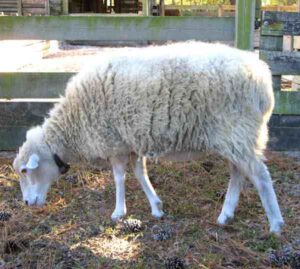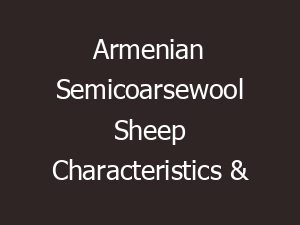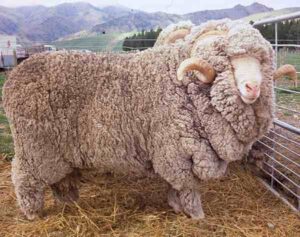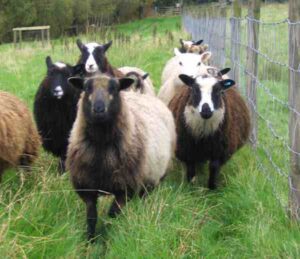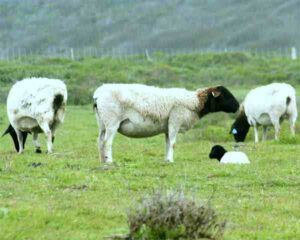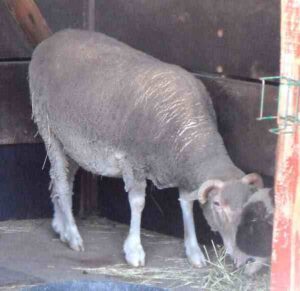The Hampshire sheep is a breed of domestic sheep from United Kingdom. It is also known as Hampshire Down sheep, and it was originated around 1829.
It was developed from a cross of Southdowns with the Old Hampshire breed. The Old Hampshire breeds include the Wiltshire Horn and the Berkshire Nott.
A farmer in Hampshire named John Twynam crossed his then-Hampshire flock with Cotswold rams around 1829.
The resulting half-bred rams were compact and blocky animals and form around 1835, and were sold into 6 or more of what were to become the first recognized pedigree Hampshire sheep flocks in the United Kingdom.
The Hampshire sheep breed was named from the place of it’s origin. The Hampshire county is located on the south coast of England, which is an area with a kinder climate than many parts of Britain.
The first breed came to the United States in 1840. And these animals apparently met an untimely end during the Civil War and fortunately more sheep arrived in the year of 1879.
The American Hampshire Down Sheep Association was organized in 1889, which is now known as The American Hampshire Sheep Association. However, read some more information about this sheep breed below.
Hampshire Sheep Characteristics
The Hampshire sheep are large sized animals with strong muscling and deep, blocky bodies. Their look is like the oxen of the sheep world.
They are mainly white in coloration. They have dark face with moderately long and slightly dropped ears.
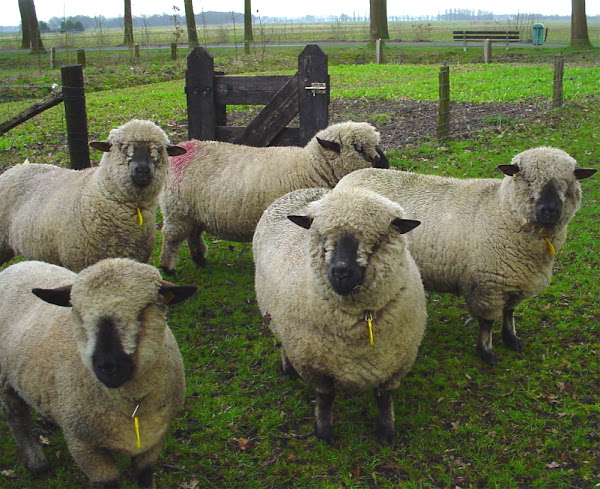
Their legs are also usually dark, with some wool present below the knees. Both rams and ewes are usually polled, that means they have no horns.
Average live body weight of the fully grown Hampshire ewes is around 91 kg. And the mature rams on average weight around 120 kg. Photo and info from Wikipedia.
Uses
This is a meat sheep breed. It is primarily raised for meat production.
Special Notes
The Hampshire sheep are very hardy animals. They are well suited to almost all climates. These animals have long breeding season, and the ewes experience a large percentage of multiple births.
Although these active and big sheep may look a bit intimidating, and the farmers describe them as quiet and laid-back. And these features are a plus for the farmers and exhibitors.
Mature Hampshire ewes on average produce around 2.7 to 4.5 kg fleece that is of 25 to 33 microns. Fleece staple length is 2 inches to 3.5 inches, and spinning count of the wool is 46 to 58 with a yield of 50-62 percent.
However, review full breed profile of this sheep in the following chart.
| Breed Name | Hampshire |
| Other Name | Also known as Hampshire Down Sheep |
| Breed Purpose | Primarily raised for meat production |
| Special Notes | Hardy and active animals, can adapt themselves to almost all climates, have long breeding season, the ewes experience a large percentage of multiple births, very active, very good for meat production |
| Breed Size | Large |
| Weight | Mature rams weight is around 120 kg, and ewe’s body weight is around 91 kg. |
| Horns | No |
| Climate Tolerance | Almost all climates |
| Color | White |
| Rarity | Common |
| Country/Place of Origin | United Kingdom |

Frequently Asked Questions
People ask many questions about Hampshire sheep. Here we are listing most common questions about this sheep breed, and trying to answer them. Hope you will find your answer. Don’t hesitate to ask us if you have more questions.
Is Hampshire sheep farming profitable?
Yes, raising these sheep is a profitable business and you will be able to make good profits from raising these animals.
How to start Hampshire sheep farming business commercially?
Raising these sheep commercially is relatively easy. You can start commercial production of Hampshire even if you are a beginner. Just select a good farm location, make a good house for your animals, feed them good quality food and take good care of them.
Are Hampshire sheep for meat or wool?
Hampshire is actually a popular meat type breed. The lambs are known for a fast growth rate, and the ewes have a high milking ability. These animals also have a large wool patch on their head.
Why are Hampshire sheep good for meat?
The Hampshire lambs are known for their fast growth rate also for their higher level of fat packs in the flavor and succulence into the meat. The marbling of the meat gives it a delicate sweet flavor. That’s why the Hampshire is a good sheep breed for meat.
How much do Hampshire sheep cost?
Exact cost of a Hampshire sheep depends on numerous factors and can vary from place to place. Average price of a Hampshire sheep can vary from $150 to $200.
Do Hampshire sheep need to be sheared?
No, these sheep generally do not require shearing, because they naturally shed their coats.
What are the characteristics of Hampshire sheep?
The Hampshire sheep are large sized animals with strong muscling and deep, blocky bodies. Their look is like the oxen of the sheep world. They are mainly white in coloration. They have dark face with moderately long and slightly dropped ears. Their legs are also usually dark, with some wool present below the knees. Both rams and ewes are usually polled, that means they have no horns. Average live body weight of the fully grown Hampshire ewes is around 91 kg. And the mature rams on average weight around 120 kg.
